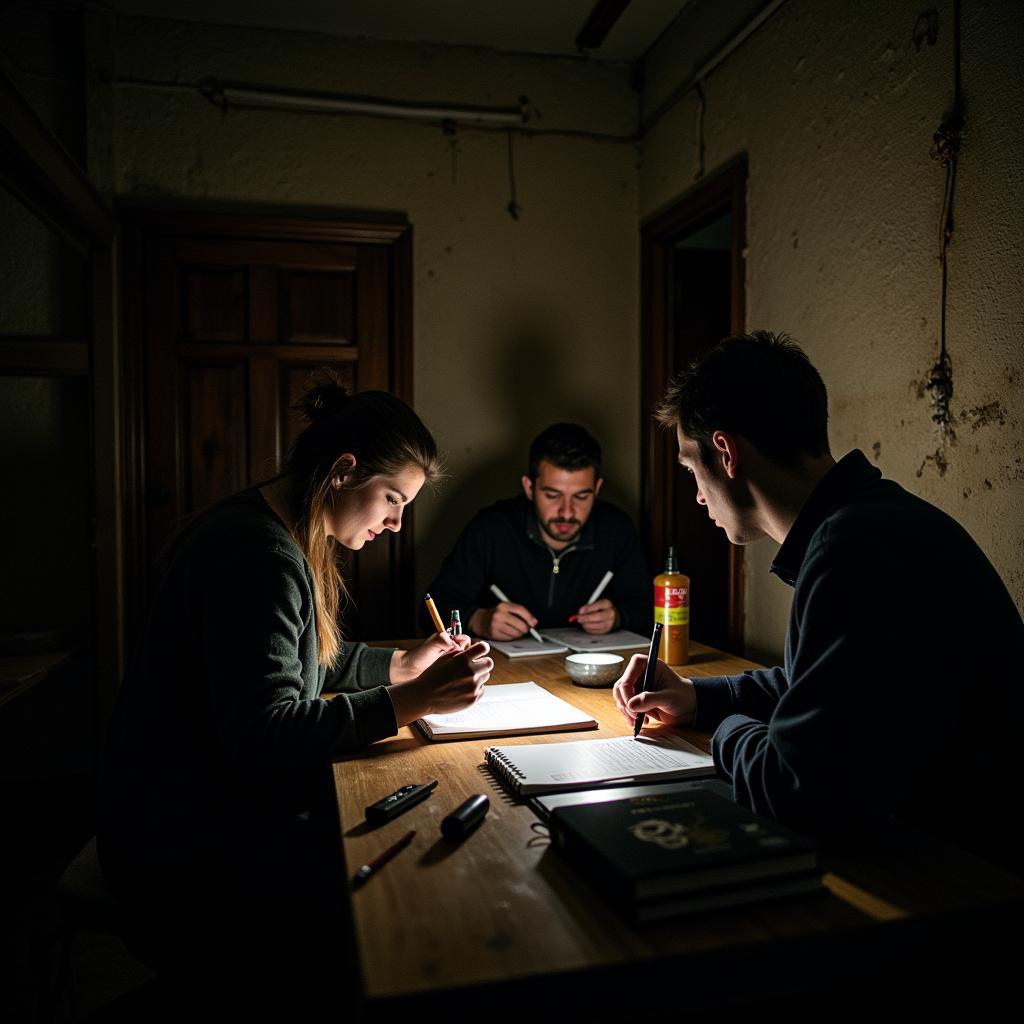Collaboration is key in the vast and often mystifying world of paranormal research. When individuals with shared passions and diverse expertise unite, the pursuit of answers gains momentum. However, navigating the unknown requires a structured approach. What, then, is the most appropriate process for research collaborators to adopt?
Establishing a Framework for Collaboration
 Research collaborators planning a meeting
Research collaborators planning a meeting
Before embarking on any investigation, a clear and concise framework is paramount. This involves:
1. Defining Objectives: What are the specific goals of the collaboration? Is it to investigate a particular phenomenon, analyze existing data, or conduct field research? Clearly articulating the objectives ensures everyone is on the same page from the outset.
2. Defining Roles and Responsibilities: Each collaborator brings unique skills and knowledge to the table. Assigning specific roles based on individual strengths fosters efficiency and avoids redundancy. A historian might focus on archival research, while a paranormal investigator gathers on-site data.
3. Communication Protocol: Open and consistent communication is crucial. Establishing a preferred mode of communication (e.g., email, video conferencing) and frequency of updates ensures everyone remains informed and aligned.
Methodical Data Collection and Analysis
 Paranormal research team collecting data
Paranormal research team collecting data
The heart of any successful research project lies in the rigor of its methodology.
-
Standardized Data Collection: Whether it’s eyewitness accounts, EMF readings, or photographic evidence, employing standardized methods and tools across investigations ensures data consistency and reliability.
-
Objective Analysis: Personal biases can cloud judgment, especially in a field as subjective as paranormal research. Implementing objective analysis techniques minimizes subjectivity. For instance, employing blind analyses where researchers are unaware of the context of the data helps reduce bias.
-
Data Management: A centralized system for storing, organizing, and accessing data is essential. This allows for efficient retrieval, cross-referencing, and ultimately, a more comprehensive understanding of the phenomena under investigation.
Ethical Considerations
Ethical considerations are paramount in paranormal research, especially when dealing with sensitive topics and personal experiences.
-
Informed Consent: Always obtain informed consent from individuals involved in investigations, particularly witnesses or individuals claiming paranormal experiences. Transparency about the research process and potential risks is crucial.
-
Respect for Privacy: Protecting the identities and personal information of individuals involved in the research is non-negotiable. Anonymity and data encryption are essential measures to safeguard privacy.
-
Objective Reporting: Findings should be reported objectively, regardless of personal beliefs or desired outcomes. Presenting both supporting and contradictory evidence fosters transparency and scientific integrity.
The Importance of Continued Learning
The field of paranormal research is constantly evolving. Collaborators must embrace a mindset of continuous learning and development.
-
Peer Review and Feedback: Sharing research findings with peers within and outside the collaborative group is essential for receiving constructive criticism and refining methodologies.
-
Staying Abreast of Research: Regularly engaging with academic journals, attending conferences, and participating in online forums dedicated to paranormal research ensures collaborators remain up-to-date with the latest findings and advancements in the field.
Conclusion
The most appropriate process for research collaborators in paranormal investigation hinges on establishing a robust framework, adhering to rigorous methodologies, upholding ethical principles, and fostering an environment of continued learning. By embracing these principles, research collaborators can navigate the uncharted territories of the paranormal with increased clarity, integrity, and the potential for groundbreaking discoveries.
FAQs
1. How do we choose a research topic that aligns with everyone’s interests?
Start by brainstorming individual areas of interest within the paranormal. Look for overlapping themes or phenomena that pique the interest of multiple collaborators.
2. What if there are disagreements within the group regarding data interpretation?
Disagreements are natural. Establish a respectful process for discussing differing viewpoints, focusing on evidence and logical reasoning. Consulting external experts can also provide valuable perspectives.
3. How can we ensure our research findings reach a wider audience?
Consider presenting findings at conferences, publishing in relevant journals, or creating blog posts or articles for paranormal-themed websites.
4. How do we handle sensitive information shared by witnesses during investigations?
Prioritize confidentiality and anonymity. Use pseudonyms to protect identities and store sensitive data securely, following ethical guidelines for data protection.
5. What resources are available to enhance our understanding of paranormal research methodologies?
Explore academic databases for journals dedicated to parapsychology and anomalous experiences. Online forums and organizations dedicated to paranormal research often offer resources and guidance.
what is a planned method vs as conducted in research
For any inquiries or assistance with your Paranormal Research endeavors, don’t hesitate to contact us:
Phone: 0904826292
Email: research@gmail.com
Address: No. 31, Alley 142/7, P. Phú Viên, Bồ Đề, Long Biên, Hà Nội, Việt Nam.
Our dedicated team is available 24/7 to provide support and guidance.